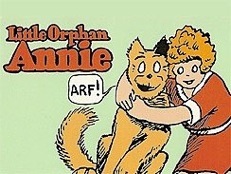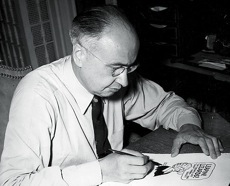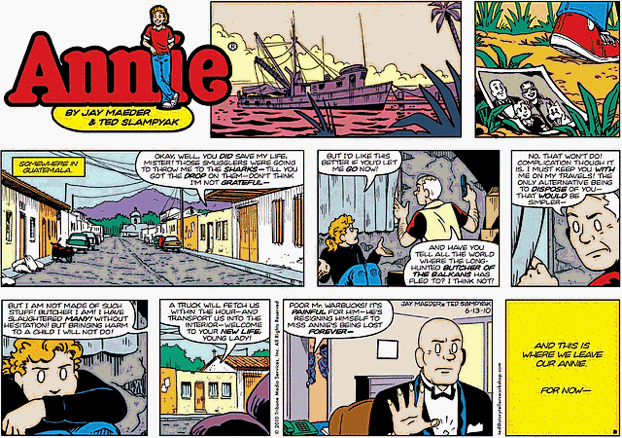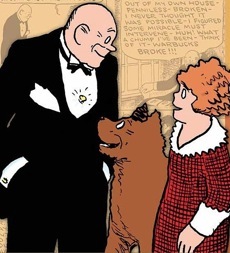Annie Warbucks
d. June 13, 2010
Annie Warbucks, the plucky and lovably independent child whose widely read adventures earned her the universally known nickname "Little Orphan Annie," died June 13 after her caretakers at Tribune Media Services, a division of the foundering newspaper and broadcasting giant Tribune Company, ordered her life-support discontinued. She was 85.
Annie's picaresque life was chronicled for decades in newspaper comics pages by cartoonist Harold Gray, and then by a series of less able successors hired by the Chicago Tribune-New York News Syndicate after Gray's death in 1968. At the height of her popularity during the Great Depression, Annie also appeared in a daily radio serial first heard in 1930 on the Chicago Tribune's station WGN, then on the NBC Blue network and the Mutual network from 1931 to 1942. In her later years, she found her life, like those of such other fabled American women as Annie Oakley and “unsinkable” Molly Brown, used as the basis for a Broadway musical.
Annie grew up in a small, poorly funded orphanage where she was left as an infant. In infrequent interviews over the years, she said she had no knowledge at all of her family, but that she had reason to believe the orphanage headmistress she remembered as "Miss Asthma" did know who her parents were but refused to divulge the information. Miss Asthma, whose full name could not be confirmed, died in a fire at the orphanage shortly after Annie ran away from the institution and somehow became acquainted with billionaire industrialist Oliver Warbucks, who took such a liking to the self-sufficient child that he later adopted her.
Gray began to write and illustrate Annie's life in August 1924, and the "Little Orphan Annie" comic strip became a mainstay of the funny pages, appearing in hundreds of newspapers throughout the heyday of adventure strips in the 1930s, 40s and 50s. Changing times had diminished the strip's fortunes even before Gray died on May 9, 1968, but it remained a popular feature in many papers. The Tribune-News Syndicate, however, hired several writers and artists to continue the strip after Gray's death, most described by Annie and her supporters as "talentless hacks."
There was little Annie could do about the situation since the syndicate had gained perpetual rights to her name and likeness in a questionable arrangement that dated back to her days in the orphanage. But readers and newspaper editors complained, and papers began to drop the strip, until syndicate editors had the bright idea of cashing in on 1970s nostalgia for the Depression era by reissuing Gray's original work from the 1930s. This was not a completely happy solution since the space consigned to comic strips had been reduced significantly by 1974, making Gray's vintage panels difficult to read. But it kept the strip running until 1977, when the Broadway debut of "Annie," the hit musical that depicted a sanitized version of Annie's early life, brought renewed interest in the strip.
"Annie" proved to be one of Broadway's most successful original musicals of recent years, running for 2,377 performances. Its success even inspired a largely forgotten, hard-luck sequel titled "Annie 2: Miss Hannigan's Revenge" and then "Annie Warbucks." That show had an extraordinarily long and difficult out-of-town tryout before it opened and died in New York in 1993. The extremely successful original, however, ran for nearly six years, launched four road companies, was filmed in 1982 and is scheduled for a Broadway revival in 2012.
Unfortunately, transferring the musical's success back to the comic strip proved impossible in the long run, given the deadly conditions facing all comics: the loss of several hundred daily newspapers over the last three decades, the change in reading habits that have doomed nearly all continuing-story strips, and the fact that today's surviving strips are printed at literally half the size they were only 40 years ago. Leonard Starr, the talented and highly regarded creator of the Mary Perkins, On Stage strip, breathed new life into Little Orphan Annie for more than a decade before he retired in 2000, but the strip continued to lose circulation. Spokesmen for Tribune Media Services, as the Tribune-News Syndicate is now known, were tightlipped about the company's decision-making but confirmed that the strip was appearing in fewer than 20 papers when Annie's condition took a turn for the worse early this year.
Annie was known to have developed an unexplained medical condition in childhood that gave her the appearance of a pre-pubescent girl all her life. Her eyes also were affected, resulting in a look that even friends often described as "blank." However, this lifelong condition is not believed to have contributed to her recent ill health, a Tribune spokesman said.
It could not be determined at press time if Annie leaves any immediate survivors. Warbucks, her benefactor and adoptive father, became a reclusive figure in recent years but is believed to have preceded her in death. Sources indicated that Annie's longtime companion Sandy also died recently. Sandy was often described by acquaintances as an "odd looking mutt" but he was, by all accounts, extremely loyal and helpful to Annie, especially in her declining years, and was very well-behaved. He barked quietly and infrequently, friends said, producing a sound that onlookers invariably described as "arf." Oddly, Sandy developed the same medical condition that afflicted Annie, a Tribune spokesman confirmed, giving him peculiarly white eyes and extending his lifespan to at least five times that of a normal canine.
It was often thought that Little Annie Rooney, a rival comic-strip waif from the 1930s through the 1960s, was somehow related to Little Orphan Annie, but Rooney consistently denied any connection. A spokeswoman for Playboy Enterprises said its magazine's voluptuous and frequently naked comic-strip heroine Little Annie Fanny also was not related to Little Orphan Annie, although the two had met at several Playboy-sponsored functions in Chicago.
Hours before Annie's death, Tribune issued a confusing statement from its licensing vice president, Steve Tippie, that read in part: "Annie, unlike many strips, has such wide, almost iconic presence in our culture that it would serve the character and our business best if we focused on other channels more appropriate to the 'kids' nature of the property. As a sequential visual story-telling property in mobile, eReader/iPad and other yet-to-be conceived electronic channels, I would pump up the probability considerably that we'll see new products."
Doctors in attendance said Annie's only response to Tribune's statement was "Leapin' lizards."








